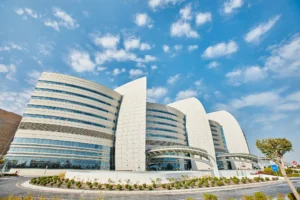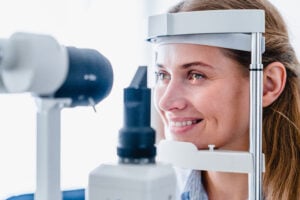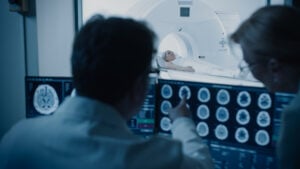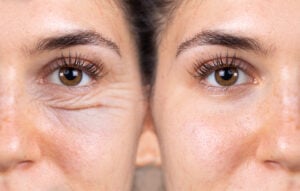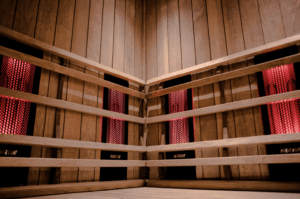Addiction and unresolved trauma affect millions of individuals and families around the world. These challenges are deeply personal, often complex, and continue to be a significant public health concern.
In the UK, over 137,000 adults begin treatment for substance misuse in England each year. In the United States, around 46 million people were estimated to be living with a substance use disorder in 2022, according to the National Survey on Drug Use and Health. Despite growing awareness, access to treatment remains limited—only 14.9% of those affected received any form of treatment in the past year, leaving the vast majority without professional help.
As patients seek more holistic and tailored rehabilitation experiences, some are looking beyond their home countries for rehab abroad. Rehab in Thailand has quietly gained attention, offering a range of addiction and trauma recovery programs that combine clinical therapy with tranquil settings and relative affordability.
To understand what drives this trauma medical travel trend, and what international patients should consider, MTM spoke with Mike Miller, founder of the Yatra Trauma Centre in Thailand and a certified Clinical Trauma Professional. In this conversation, we explore Yatra’s approach to trauma-informed care, the practicalities of planning rehab abroad, and broader reflections on treating trauma in a cross-cultural setting.
Here’s what he shared with us in our conversation.
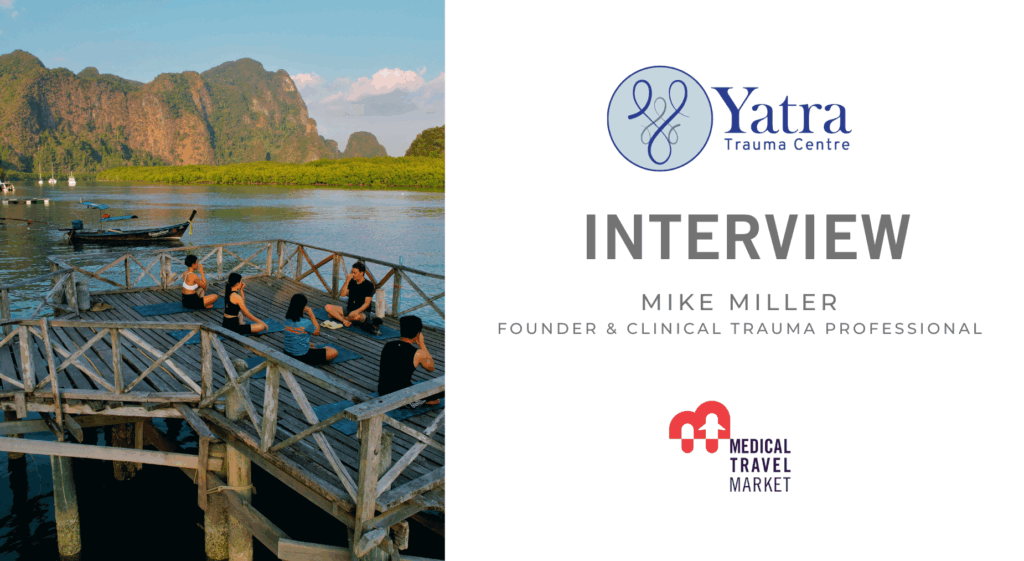
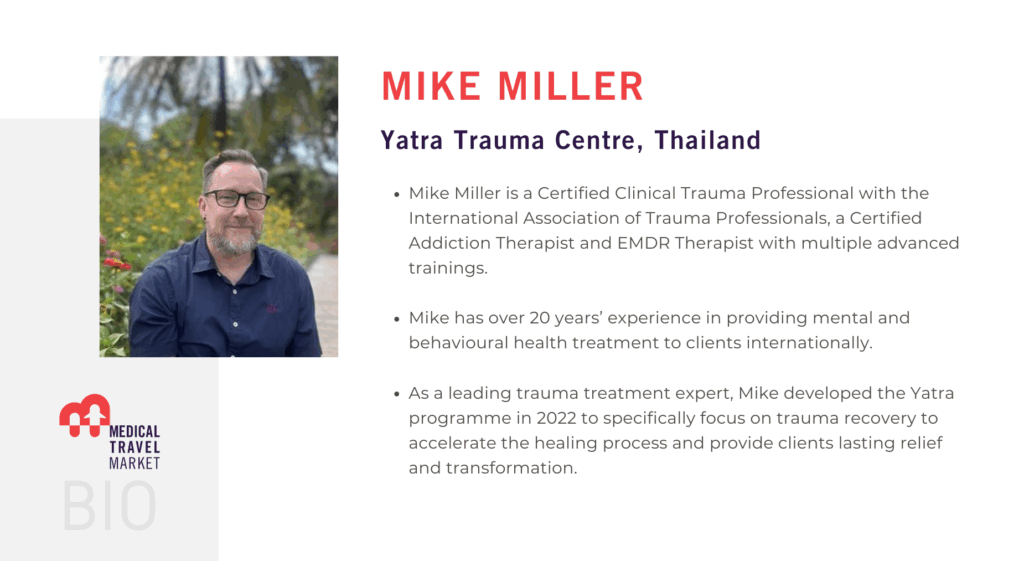
What does Yatra mean?
- ‘Yatra’ is originally a Sanskrit word but it’s also used in Thai language. It means ‘journey’ and is commonly associated with a spiritual journey of healing and emotional significance, and for many of our clients, that’s exactly what this experience becomes.
- At Yatra, our mission is simple; to help people overcome trauma that prevents them from living the life they deserve to have.
What was your inspiration to open a treatment centre in Thailand?
- After decades of working in mental and behavioural health, and being a survivor of both addiction and trauma, I saw how many people were falling through the cracks of conventional addiction treatment. There was a real lack of trauma-informed care, and many centres were still relying on outdated, one-size-fits-all models that didn’t truly address the underlying pain driving compulsive behaviours.
- I felt called to create a space that could offer something different: personalised, evidence-based trauma care grounded in both neuroscience and compassion.
- Having lived in Thailand for 12 years, it has become my second home and the country is already known globally as a place of deep healing and wellness retreats destination; it was the natural choice to open in Thailand.
- But I didn’t want to build just another rehab or retreat. Yatra is something in between—a clinically grounded trauma centre where people can come not just to get clean, but to truly heal and reset their lives. The Yatra programme is what I wish would have been available when I was seeking treatment over 20 years ago.
What makes Thailand a leading choice for trauma recovery and rehab?
- The Yatra facility is located in Krabi, Thailand, 30 minutes away from any town or distractions. offering a peaceful and intimate environment for recovery.
- We utilize the natural environment, including our proximity to the sea, which allows clients to be grounded and promotes healing. For our activities, outside of psychotherapies, they are rooted in each clients’ personalised treatment programme – whether that’s kayaking around Thailand’s limestone cliffs, visiting islands or simply learning to relax in our tranquil setting. Southern Thailand’s climate allows us to grow farm to table food year-round in our own garden at the facility, so that we can provide nutritious meals to our clients.
- By personalising every aspect of their recovery journey at Yatra, we are ensuring our clients receive the care, structure, and therapeutic experiences they need to heal in a way that is meaningful to them.
- Additionally, Thailand’s cost of living is more affordable compared to many Western countries. Allowing us to deliver high-standard care without compromising the quality, which makes our treatment centre more accessible to a wider range of people.
Which specific conditions do you treat?
- We treat a variety of conditions, including PTSD, anxiety, depression, addiction in all its forms, compulsive self-soothing behaviours, developmental trauma, grief, and executive burnout.
What types of addictions do your programs address, such as alcohol, drug, or sex-related addictions?
- We provide personalised treatment for various addictions, including substance-related addictions such as alcohol and drugs, as well as behavioural addictions.
- These include gambling, compulsive shopping, work, exercise, internet, sex and relationship-related compulsions, as well as compulsive eating.
- We also provide support for individuals dealing with other compulsive behaviours that may impact their well-being and daily functioning.
Who would be the ideal candidate for your trauma healing retreat?
- The ideal candidate for our trauma healing retreat is someone who has tried other traditional treatment programmes but still feels like something is missing.
- Many of our clients have experienced trauma that was misdiagnosed or misunderstood, leading to treatment approaches that didn’t address the root cause. This often results in burnout, anxiety, depression, or compulsive self-soothing behaviours that feel impossible to shift.
- Our programme is designed for individuals who are ready for a different kind of healing experience—one that’s grounded in the latest neuroscience, trauma-informed care, and deeply personalised support.
- We meet each person where they are, using tailored methodologies to build a plan that works for their unique journey.
- We also recognise that healing doesn’t happen in isolation. That’s why we involve families and loved ones, offering joint sessions and practical support to help them become part of the recovery process. This holistic approach is what truly sets our programme apart.
What is your patient intake process?
- We have designed our programmes to have a much higher ratio of staff to clients at any given time. We have a maximum of seven clients in the programme at any one time, this allows us to focus on each person’s specific programme with the necessary time and energy they need.
- Our intake process typically begins with clinical assessments, completed by a clinician, not a salesperson, which is typical of most other treatment facilities. These assessments are completed during a video call, not an audio call, which allows for our clinicians to gather relevant information from our prospective client and evaluate both the prospective client’s clinical landscape and their needs for recovery.
- During the pre-admission period, we often coordinate with the prospective client’s personal medical or mental health providers. We do this to ensure that all information pertinent to treatment is gathered and that there is a guaranteed continuum of care including all treatment providers, from pre-admission to their return back into the care of these providers.
- We also assist with the logistics, such as travel arrangements, visa requirements where applicable and other necessary accommodations, ensuring a smooth, safe and efficient transition for our patients into the programme.
What differentiates Yatra’s treatment approach from other rehab centers in Thailand?
- What sets Yatra apart from other rehab centres in Thailand is our commitment to evidence-based, client-centred care rooted in the latest neuroscience—not outdated models. While many traditional programmes still rely on methods from as far back as the 1930s, we combine the most current scientific research with a holistic, trauma-informed approach that truly supports long-term recovery.
- We work with both the body and the mind—using bottom-up techniques to calm the nervous system and bring clients into a parasympathetic state, so they’re physically relaxed, and thus able to engage in top-down cognitive and emotional therapies more effectively.
- We do not do group psychotherapy as it can be very triggering for many people who are survivors of trauma and addiction. We use groups for educational and skills building purposes.
- Being trauma-informed and client-centred means that we do not punish people for having the symptoms of the disorder that they have come to have treated. Many traditional treatment centres see symptoms such as an angry outburst or a disengagement in a group as a patient failing to behave as expected, or being resistant to treatment, and that could possibly lead to that facility taking away privileges or even discharging that patient, while we see it as our responsibility to address the underlying issues driving the behaviours and helping the patient change, as that is why they have come to us.
- We do not infantilize patients by taking away all of their electronics before even knowing if those things are problematic. We assess with the patient and only intervene if necessary for recovery. People need to learn how to manage their relationship to electronics before being discharged with access to these devices 24-7.
- Ultimately, we are a clinic led by clinicians, rather than a business run by businessmen – meaning healing—not profit—is our priority. With an industry-leading therapist-to-client ratio of 3:7, we offer a level of personalised care and depth of support that goes far beyond symptom management.
Talk To Our Medical Travel Team
Can you explain some of the primary healing modalities and therapies that clients experience during your trauma retreats?
- One effective therapeutic method that we utilised is EMDR (Eye Movement Desensitisation and Reprocessing). This approach allows the patient to desensitise their traumatic memories so that they can recall them without an intense physiological response. It also helps change the way the patients think about those memories by activating their brain’s reason thinking to create positive connections of those memories. It is often referred to as “the gentlest form of trauma therapy”, as it does not require re-telling of traumatic narratives which can actually retraumatise people.
- Cognitive Behavioural Therapy (CBT) is another method that we use – this allows us to identify our patient’s deep-rooted trauma and correct their distorted thinking patterns.
- To ensure their body is in a relaxed and parasympathetic state, we also suggest and incorporate yoga, meditation, mindfulness practices, breath work, ice baths, sauna, massage therapy and physical exercise appropriate to their fitness level.
- We also employ Internal Family Systems (IFS) therapy to help individuals explore and heal internal emotional dynamics by understanding different parts of themselves that may be holding pain or driving maladaptive self-soothing behaviours.
Could you walk us through a typical day for someone attending your signature trauma healing retreat?
- A typical day at our trauma healing centre begins with a morning yoga session, followed by a nourishing breakfast and educational group session.
- The rest of the day is structured around their individual therapy sessions, combining with various therapeutic interventions such as EMDR, IFS, CBT, art therapy, massage therapy, personal training, and mindfulness practices.
- On Sundays, we take a break from the routines for restorative excursions. It can be exploring nearby islands, hiking, a trip to a beach, or simply enjoying the view of the surroundings. This provides clients with a bit of exposure to Thailand which they have frequently not had a chance to explore, while being supported and safe with our staff, as well as a break from the intensity of a full week of trauma treatment.
What practical advice would you give someone who’s considering traveling to Thailand specifically for trauma and addiction therapy?
- Travelling internationally to Thailand for trauma and addiction therapy can be a great decision, but it’s important to plan carefully. Practical considerations vary from person to person, but we recommend starting with logistics by ensuring travel documents, visas, and health insurance are in order.
- It’s also essential to understand the full scope of treatment costs, including what’s covered in the programme and any additional expenses such as flights or extended stays. Choosing a centre that aligns with your personal needs and values is key that prioritizes individualised care, experienced clinicians, and a supportive healing environment.
Traveling abroad for sensitive treatment can raise concerns about confidentiality, safety, language barriers, and cultural differences. How does Yatra address these concerns to reassure potential international clients?
- Confidentiality is our top priority. Therefore, personal information is strictly confidential unless the client provides explicit consent otherwise.
- To ease any language or cultural barriers, our staff is always available to provide assistance with navigating Thai language and local customs.
What protocols or medical partnerships are in place should a client require urgent or specialized medical attention during their stay?
- We work closely with a licensed psychiatrist who is available for online consultations as needed.
- We also have access to a nearby local clinic for immediate care and hospitals for more advanced medical support.
What is the approximate cost of your signature trauma healing retreat program for a typical 28-day stay in Thailand?
- The cost of our base programme is $13,000 USD for residential treatment, all inclusive. We also have a range of packages available to suit each individual’s needs, including personalised residential and outpatient programmes or online therapy, when deemed an appropriate level of care through clinical assessment. We take a personalised approach to care—including the programme design—so we offer bespoke packages based on the level of support, length of stay, and specific therapeutic requirements.
What kind of aftercare or follow-up support do you offer clients once they return home?
- We offer free and ongoing access to online aftercare groups, where clients can stay connected with others on a similar healing path. We also provide the option for ongoing therapy sessions for clients to continue supporting their healing journey.
- Each client also receives a comprehensive aftercare plan to meet their specific needs, and we maintain regular contact to offer updates, check-ins, and guidance.
– End of Interview –
About MTM Global
MTM Global is a UK-based international healthcare consultancy and online travel agency specializing in premier health tourism.
For all corporate and media inquiries, click here.

